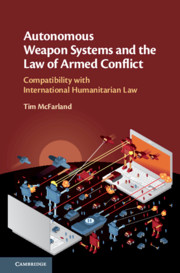 Autonomous Weapon Systems and the Law of Armed Conflict
Autonomous Weapon Systems and the Law of Armed Conflict Book contents
- Autonomous Weapon Systems and the Law of Armed Conflict
- Autonomous Weapon Systems and the Law of Armed Conflict
- Copyright page
- Contents
- Figures and Tables
- Acknowledgements
- 1 Introduction
- 2 Legal Background
- 3 Understanding Weapon Autonomy
- 4 Identifying Legal Issues
- 5 Weapons Law
- 6 Targeting Law
- 7 Accountability
- 8 Recommendations
- Index
6 - Targeting Law
Published online by Cambridge University Press: 17 June 2020
- Autonomous Weapon Systems and the Law of Armed Conflict
- Autonomous Weapon Systems and the Law of Armed Conflict
- Copyright page
- Contents
- Figures and Tables
- Acknowledgements
- 1 Introduction
- 2 Legal Background
- 3 Understanding Weapon Autonomy
- 4 Identifying Legal Issues
- 5 Weapons Law
- 6 Targeting Law
- 7 Accountability
- 8 Recommendations
- Index
Summary
This chapter covers targeting law, which governs the ways in which weapons may be used in armed conflict. As integration of autonomous control into weapon systems necessarily affects the procedures to be followed in operating those weapons, it must be assessed with respect to the rules of targeting law. Specifically, autonomy in weapons relates to the ‘procedural’ side of targeting: questions of how the legal status of a potential target is to be assessed, what precautions must be taken in planning and conducting an attack, who is responsible for those tasks, and so forth. Accordingly, the first part of the chapter discusses the necessity for and general form of human involvement in planning and conducting autonomous attacks. It refutes the view that human involvement would or could be entirely missing from operations involving autonomous weapons. The second part steps through a model 6-step targeting process to explain the respective contributions of humans and autonomous systems at each stage.
- Type
- Chapter
- Information
- Autonomous Weapon Systems and the Law of Armed ConflictCompatibility with International Humanitarian Law, pp. 113 - 126Publisher: Cambridge University PressPrint publication year: 2020
